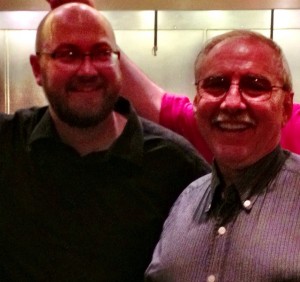
The Secular Therapist Project, which I have written about before, issued a press release today in celebration of a major milestone: over 2000 registered clients in only a year. As both a registered therapist with the project and a member of the assessment team, I am extremely excited about this growth. It shows the need for this type of service and is an extension of the massive growth in the overall secular community.
Now, in order to support both the existing client base and our continued growth, we need your help. If you are a secular mental health professional, please consider applying for the project as a therapist and spreading the word among your colleagues. If you have friends or know someone who fits this description, encourage them to apply as well.
If you are someone in need of mental health services, consider using the project to help you locate a therapist. Before a therapist is added to the database, she or he is screened by the assessment tram (STP founder Dr. Darrel Ray, myself, and two other experienced therapists) for two primary criteria: evidence of involvement in the secular community and the use of evidence-based practice. EBP means that the therapists use therapeutic methods that have been empirically shown to improve various types of psychological distress, such as depression or anxiety, rather than relying on unproven or pseudoscientific techniques.
The full press release is below:
Secular Therapist Project Assists 2,000 People in First Year, Seeks Additional Therapists.
August 15, 2013 – In its first year of operation, Recovering From Religion’s Secular Therapist Project has provided assistance to 2,000 people seeking a secular mental health professional through the project website – www.seculartherapy.org. This website allows both people who are looking for a therapist and licensed secular therapists to register and connect with one another in communities across the country.
Why do people need secular therapists? All too often, religious mental health professionals allow their religious beliefs to influence their professional practice. Some Christian institutions such as Liberty University, Regent University and Oral Roberts University even incorporate Christian teachings into graduate degrees in counseling, psychology and social work and encourage their graduates to apply Christian teachings with their clients. Those graduates can be licensed in most states. Not only does this prevent patients from receiving evidence-based care, if a client is not a member of that religion, this can dissuade them from seeking care or continuing with needed therapy.
It is easy to find Christian counselors around the country, but many secular therapists cannot openly advertise as secular for fear of losing clients or other negative social and professional consequences. A lay person cannot always tell who does and does not use evidence-based therapy methods and cannot always be open about their need for secular therapy when they need help. This makes the process of finding a therapist challenging, frightening and potentially harmful.
The Secular Therapist Project is here to help connect people in need with professionals who use evidence-based methods and will not incorporate religious teachings, prayer or other religious tactics during therapy. The service is confidential and seeks to protect both therapist and client. All therapist applicants are carefully screened by the project team.
“While we are extremely happy with our stunning growth thus far, we need more therapists,” says project director Dr. Darrel Ray. “The number of people seeking help is much larger than we can meet with our current therapists and many of these individuals have special needs beyond the training of those in our current registry. Ideally, we will eventually have a secular therapist in every community. Our goal is to register 200 therapists by the end of 2013 to meet this growing need.”
Individuals seeking assistance from a secular therapist and secular therapists interested in participating in this project can learn more at www.seculartherapy.org. To learn more about STP or to schedule an interview with project director Dr. Darrel Ray, contact Darrel@recoveringfromreligion.org. To learn more about Recovering From Religion or to schedule an interview with Sarah Morehead, contact admin@recoveringfromreligion.org.
